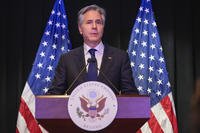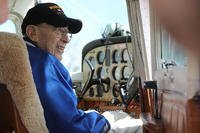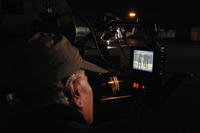The Associated Press reports, "U.S. military units assigned to track down Iraqi weapons of mass destruction have run out of places to look and are getting time off or being assigned to other duties, even as pressure mounts on President Bush to explain why no banned arms have been found.
After nearly three months of fruitless searches, weapons hunters say they are now waiting for a large team of Pentagon intelligence experts to take over the effort, relying more on leads from interviews and documents.
"It doesn't appear there are any more targets at this time," said Lt. Col. Keith Harrington, whose team has been cut by more than 30 percent. "We're hanging around with no missions in the foreseeable future."
Over the past week, his and several other teams have been taken off assignment completely. Rather than visit suspected weapons sites, they are brushing up on target practice and catching up on letters home.
(via Cursor)
THERE'S MORE: A former senior Iraqi brigadier general says that, in 1996, Saddam began putting together teams of scientists and mobile labs to someday rebuild his stockpile of illict weapons. But the program "did not produce any illegal arms and that none now exist in Iraq," according to the Los Angeles Times.
However, the officer insists that the teams did put plans on paper "to quickly develop weapons of mass destruction if U.N. sanctions against Iraq were lifted," the paper reports.
"We could start again anytime," said the officer, who spoke on condition of anonymity because he said he fears for his life. "It's very easy. Especially biological."
"The point was, the Iraqis kept the knowledge," he explained during a lengthy interview Friday in which he offered tantalizing details of secret programs. But U.S. weapons hunters "will never find anything here. Only oil..."
The intelligence officer's account, parts of which could not be independently verified, gives ammunition to both sides of the controversy (over whether or not Iraq had banned weapons). He said that U.N. sanctions and inspections in the 1990s crippled Iraq's ability to build illegal weapons and that Hussein's chemical, biological and nuclear programs were effectively eliminated in the mid-1990s.
But his description of an ongoing effort to prepare for illicit weapons production programs in the future suggests that Hussein would have remained a serious threat if U.S.-led forces had not ousted the dictator.








